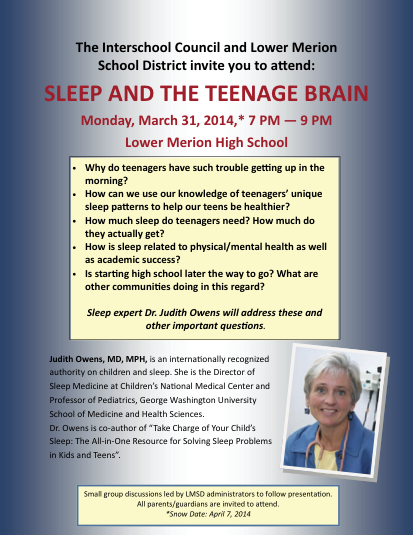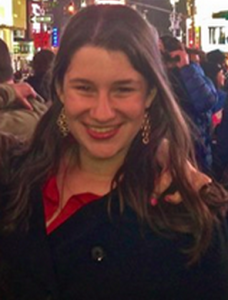Sleep and the Teenage Brain

As we struggle to get out of our bed each morning, many students wonder why? Why are we so tired? Why do we have to get up? Well, Monday March 31st, 2014 at 7pm at Lower Merion High School, sleep expert Dr. Judith Owens will answer our questions followed by small group discussions led by Superintendent Christopher McGinley and LMSD administrators. One of the topics that will be discussed is flipping starting times for elementary and high schools, a topic near and dear to everyone’s hearts.
Amy Norr, a parent in the Harriton community, is the woman who has worked to put this entire event together. She explained, “I have been interested in the issue of adolescent sleep, and the lack thereof, since learning about it in my freshman psychology class in college. My interest increased when my two older children were Harriton students, and I saw how tired they were on school days, particularly the second half of the week as their sleep debt increased. And, I noticed how much nicer and less stressed they were on those 2 hour delay days.“
The Interschool Council (a parent leadership group within the Lower Merion School District) and Lower Merion School District are hosting Dr. Judith Owens. Owens is an internationally recognized authority on children and sleep. She is the co-author of the book “Take Charge of Your Child’s Sleep: All-in-One Resource for Solving Sleep Problems in Kids and Teens.” She is also the Director of Sleep Medicine at Children’s National Medical Center and Professor of Pediatrics at George Washington University School of Medicine and Health Sciences.
Dr. Judith Owens will aim to answer questions such as: why do teenagers have such trouble getting up in the morning? How can we use our knowledge of teenagers’ unique sleep patterns to help our teens be healthier? How much sleep do teenagers need? How much do they actually get? How is sleep related to physical/mental health as well as academic success? Is starting high school later the way to go? And what are other communities doing in this regard?
All students, parents and guardians are invited to attend and take part.
Amy Norr continued to explain, “Research shows that most teenagers require 8 1/2 – 9 1/4 hours of sleep nightly for optimal functioning, but few get that amount of sleep. Lack of sleep may lead to all kinds of problems – which Dr. Owens will detail; optimal sleep leads to much healthier humans (teens and others alike), physically, emotionally, academically.”
Dr. Owens was recently featured in a New York Times piece on the topic – “To Keep Teenagers Alert, Schools Let Them Sleep in”. In this article she states, “It’s still a badge of honor to get five hours of sleep. It supposedly means you’re working harder, and that’s a good thing. So there has to be a cultural shift around sleep.” If you agree or disagree and have more to say, come out and be a part of the discussion. “
For any questions about the event, contact Amy Norr at [email protected].

Alana Koenig has been involved in newspaper for the past few years and is very excited to serve as a News Editor for the banner. Writing is only one of...

